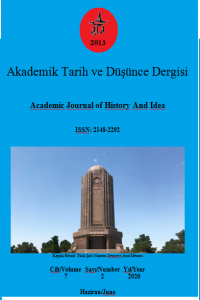“Genç Werther’in Acıları” Romanındaki İzleklerle Toplumsal Değişimlere Etkisi Bağlamında J. W. von Goethe’nin Evrensel Kişiliği ve Edebi Dehası
Bu çalışmanın amacı Alman ve dünya edebiyatının önemli ve etkin yazarlarından Johann Wolfgang von Goethe’nin dehasını ve evrensel kişiliğini, sanatçının yaşamı ve bir edebi eseri üzerinden irdelemektir. Varsayımımız, Goethe’nin kendi edebi dehası sayesinde Genç Werther’in Acıları eseriyle; içinde bulunduğu çağın toplumunda toplumsal-kültürel değişime yol açtığı yönündedir. Öncelikle Goethe’nin neden deha olarak nitelendirildiğinin anlaşılabilmesi adına Antik dönem filozoflarından günümüze kadar birçok filozofun ve eleştirmenin deha üzerine olan görüşleri incelenmiştir. Goethe’nin GençWerther’in Acıları eserini yazmadan önceki hayat tecrübeleri ve yaşam üzerine düşünceleri ile Genç Werther’in Acıları adlı yapıt çalışmamızın genel sınırlarını oluşturmuştur. Bunlar haricinde, Goethe’nin edebi dehası ve Genç Werther’in Acılarıeseri sayesinde yarattığı toplumsal değişimin saptanması adına edebiyat tarihçilerin topladığı verilerden ve görüşlerden faydalanılmıştır. Çalışmamız sonucunda Goethe’nin dehası bilimsel verilerle birlikte temellendirilmiştir. Goethe’nin dehasının Genç Werther’in Acıları eserinde ne biçimde vuku bulduğu, eserin içeriğine ve formuna nasıl sirayet ettiği açıklanmıştır. Genç Werther’in Acıları yapıtında deha özellikleri gösteren kahramanın etkisi bağlamında eser içerisinde gelişen toplumsal değişim fark edilmektedir. Goethe’nin biyografik özellikleri de göz önünde tutularak, dehasının temel olarak toplumsal olanın yararına dair işlev gösteren bir özellikte olduğu kanısına ulaşılmıştır.
Anahtar Kelimeler:
Goethe, Deha, Edebi Deha, Toplumsal Değişim, Genç Werther’in Acıları, Goethe, Deha, Edebi Deha, Toplumsal Değişim, Genç Werther’in Acıları, Genius, Literary genius, Social change, The Sorrows of Young Werther
Goethe's Universal Personality and Literary Genius in Terms of Their Impact on Social Change by the Threads in "Young Werther's Pain"
Johann Wolfgang von Goethe is one of the most important and influential writers of German and world literature. The aim of this study is to examine Goethe’s genius and his universal personality, through artist’s life and one of his literary works. Our assumption is that Goethe had led to social-cultural changes in the society of his age, thanks to his own literary genius, with his work ''The Sorrows of Young Werther''. At first, the opinions of many philosophers and critics on genius from the Ancient period to the present were examined to understand why Goethe was described as genius. Goethe's life experiences before writing The Sorrows of Young Werther his thoughts on life; and his work titled The Sorrows of Young Werther formed the general boundaries of our article. Apart from these, the data and opinions compiled by literary historians were used to determine the social change caused by Goethe’s literary genius and his work The Sorrows of Young Werther. As a result of our work, Goethe's genius was grounded based on (by) scientific data. It is also explained how Goethe's genius took place in The Sorrows of Young Werther and how it spread to the content and the form of the work. In the work of Young Werther's Sorrows, the social change that develops in the work is noticed in the context of the influence of the protagonist, who shows self-genius features. Considering Goethe's biographical features, it has been concluded that his genius is basically a feature that functions for the benefit of the social.
Keywords:
Genius, Literary genius, Social change, The Sorrows of Young Werther, Goethe, Genius, Literary genius, Social change, The Sorrows of Young Werther,
- Yayın Aralığı: Yılda 6 Sayı
- Başlangıç: 2013
- Yayıncı: Hakan YILMAZ
Sayıdaki Diğer Makaleler
Sinop’ta Geleneksel Ahşap Köy Camileri
Geç Dönem Osmanlı Eğitiminin Dinamiklerini Halide Edib’in Mor Salkımlı Evi’nden Okumak
Hizb-i Cedid’in Mevadd-ı Aşere İstekleri
Kültepe’den Amūtum İşlemeli Altın Kadeh
İslam Dünyasında Təbiətşünaslıq Elmlərinin Meydana Gəlməsi və İnkişaf Tarixi
تاثیر ادبیات و معارف قرانی در تحول معنای کلمه حبدرعصر جاهلی
Mohammad Hossein POUR MOHAMMAD
Isparta İli Ağızlarında Damak Uyumu
Əxlaqi Və Hüquqi Şüurun Mənayaradıcı İdeyaları
Karaburun Kazası Hasseki (Haseki) Köyü Osmanlı Dönemi Mezar Taşları Üzerine Bir İnceleme
